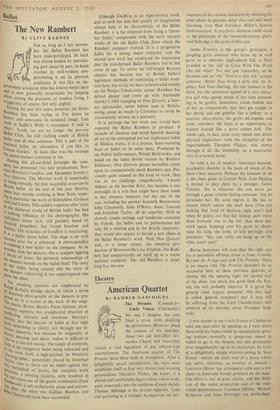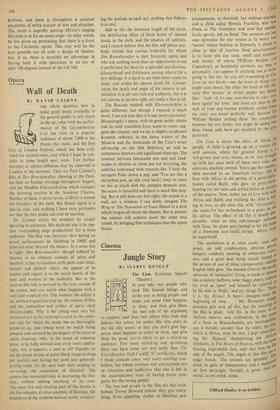Theatre
American Quartet
Uncle Vanya. (Chichester.) No one, 1 imagine, has ever liked a revue while disliking the performers. However sharp the content of the sketches, those two old box-office fav- ourites Charm and Versatility remain a vital ingredient of any cabaret-type entertainment. The American quartet of The Premise have them both in abundance. After a delightfully casual introduction, the team soon establishes itself as four very distinct and Winning personalities. Theodore Flicker, the leader, is a plump and comfortable figure whose role is to stir. quiet wisecracks into the cauldron of each sketch. Thomas Aldredge is his precise opposite. Lean and quivering as a whippet. he expresses the ncr- vousness of his various characters by shooting his arms about in gestures more clear-cut and more alarming even than Jonathan Miller's famous limb-looseness. A psychotic skeleton could stand as the prototype of the twentieth-century ghost, and Aldredge is the proto of this type James Frawley is the group's grotesque, a gangling great creature who turns up in such parts as a moronic high-school kid, a Nazi brutalist or the 'old' in Gone With The Wind. (An old what? No one can remember, so he becomes just an 'old.' You're a silly old,' accuses someone. 'Better than being a dirty old,' he re- plies.) And Joan Darling, the one woman in the show, has the enormous appeal of a very attrac- tive girl who spends much of her time pretend- ing to be gawky. Sometimes words bubble out of her so compulsively that they get caught in her throat and she gobbles like a turkey; as a neurotic chess-player, she grows all angular and tense; elsewhere she leaps at an opportunity to bounce around like a great rubber doll. The whole cast, in fact, turns every mood into direct physical expression—with the exception of the imperturbable Theodore Flicker, who moves through it all like Dimbleby on a panoramic visit to a mental home.
As with a lot of modern American humour, psychiatric disorder is the basis of much of the show's best material. Perhaps the funniest of all is the chess game in Central Park. Joan Darling is invited to play chess by a stranger, James Frawley. She is reluctant—she can never get through a game without hitting someone—but be persuades her. He soon regrets it. He has to choose which colour she shall have ('I'm not making that kind of decision right now') and when he points out that her bishop can't move three forward, two to the left, then three for- ward again, hopping over his pawn to check- mate his king, she looks at him pityingly and murmurs: 'Say, you really are hung up on the rules, aren't you?'
Revue historians will note that the right cast for a successful off-beat revue is four—Cranks, Beyond the Fringe and now The Premise. There is no reason why The Premise shouldn't be as successful here as these previous quartets of clowns. On the opening night the second half of the show was much less good than the first, , but this will probably improve. It is given the general label 'topical nonsense' (the first half is called 'general nonsense') and it may still be suffering from the Lord Chamberlain's deft removal of six sketches about President Ken- nedy.
I was unable to see Uncle Vanya at Chichester until ten days after its opening, so I went down there with my hopes raised by unanimously glow- ing notices—normally a dangerous mood in which to go to the theatre; but this production lives magnificently up to its reputation. In front of a delightfully simple wooden setting by Sean Kenny—merely the plain wall of a house which can serve, therefore, as exterior or interior— Laurence Olivier has arranged a table and a few chairs in fixed and formal positions on the stage. The effect is one of great clarity, and this holds true of the entire production and of the indi- vidual performances. Laurence Olivier, Michael Redgrave and Joan Plowright are particularly brilliant, and there is throughout a constant awareness of every nuance of text and situation. The result is superbly moving. Olivier's staging this time is as for an arena stage—in other words, he has given up pretending that there is a front to the Chichester apron. This may well be the best possible use of such a design of theatre; but, if so, there is certainly no advantage in having built it with spectators in an arc of only 180 degrees instead of the full 360.































 Previous page
Previous page